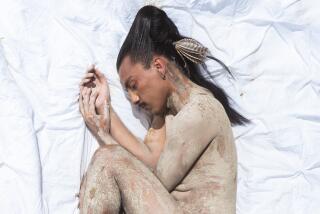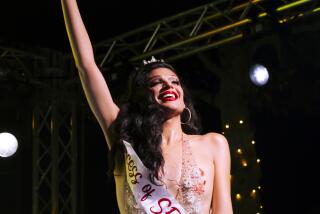Bye Bye, Beauties : Hollywood’s Love Affair With Crowned Heads of the Runway Is Over
- Share via
L.A. is not The Place for beauty queens these days. Heads don’t always turn when they walk by, agents don’t necessarily return their calls, no one is dying to turn them into movie stars or TV talk-show hostesses.
Miss USA can’t even get a guest shot on her favorite talk show.
“Arsenio, are you listening?” asks Gretchen Polhemus as she coils her sinuous, six-foot body toward a reporter’s tape recorder, in the hope that her plea will reach Arsenio Hall.
But it probably won’t--and she knows it. Today’s talent scouts have little interest in women who come equipped with satin ribbons across their chests.
Hall’s four talent-bookers, for example, don’t even have a generic category for beauty queens: “I do stars,” and they’re not stars, said one. “I do celebrities,” and they’re not celebrities, said another. A third, who books authors and intellectual types, suggested that the beauty queen falls into a category so abstruse that only the show’s producer was equipped to discuss it. (The producer did not return phone calls.)
Movie moguls and others who used to say things like “I can make you a star” seem to have disappeared from the queenly scene as well.
Angela Visser, the current Miss Universe, theoretically the most beautiful person on the planet, says that during her entire stay in Los Angeles she has not been approached for even a screen test, let alone a bit part in a movie. She’s saved the business card of everyone she’s met during her reign, however, in case one of them wants to help get her foot in the movie-making door.
Joe Reich, casting director for NBC’s soap opera “Generations,” a former casting director at Universal Studios, and a founding member of the Casting Society of America, says he knows why someone like Visser wouldn’t have movie men beating down her door.
When Reich, 44, started in the talent business about 20 years ago, he “went to so many beauty contests” that his first business clothing purchase was a tuxedo. “We were looking for talent and in the 1970s that was one place to look.” He wouldn’t check out the pageants now, however, because beauty queens usually don’t have the “commitment to the (acting) business” that is needed today.
It’s a tale of love gone sour: Los Angeles, the city that used to embrace, encourage (or try to take advantage of) every beautiful Crowned Head--from Miss Rheingold to Miss Maid of Cotton--has changed to one that almost ignores them.
Sara Meza of Los Angeles-based Madison Square Garden Television Productions, which conducts the Miss USA and Miss Universe contests every year, admits that beauty pageants and their winners are not exactly considered, well, “contemporary.”
Part of Meza’s job is to place the reigning queens on as many top U.S. TV shows as she can. But often she just can’t. “They’re resistant,” she explains. Polhemus did appear on Letterman right after she was crowned, and Visser did “The Pat Sajak Show.” But that was the end of major TV talk shows for both women during their yearlong reigns as Miss Universe and Miss USA.
Carol Propp, executive in charge of talent for “The Pat Sajak Show” and the Emmy Awards, has been in the business 14 years. Now 39, she remembers that when she was a child her family gathered around the TV to watch the Miss America contest each year, that her father always was able to pick the winner, and that the pageant was “a wonderful family kind of thing.”
In those days, Propp says, “the highest compliment anyone could pay a girl was to predict she’d grow up to be Miss America.” But there was only one Miss America then, Propp adds. And while technically there is still only one, “there’s also Mrs. America, Miss Teen Age America, Miss Mother and Daughter, Miss World, Miss Universe . . . It seems there are thousands of them.” Too many, by Propp’s reckoning, and too little interest on the part of viewers. “The whole idea has been diluted and the viewing public is confused,” she says.
(Millions still watch the televised beauty pageants, according to Meza, who said more than 300 million people in 30 countries watched the 1989 Miss USA pageant and 600 million worldwide tuned in to the Miss Universe show. In the United States, the most recent Miss USA contest got a 14.3 Nielsen rating--each point represents 921,000 homes--and ranked 37th out of 73 shows that week; Miss Universe received a 9.7 Nielsen rating and ranked 40th out of 63 shows that week. The next Miss USA pageant is scheduled to air on CBS on March 2.)
In addition to the overabundance of beauty contests and the rise of feminism, other factors have contributed to the declining cachet of pageantry. An expanded definition--and availability--of beauty through surgery and cosmetics have produced a world full of men and women to whom beauty, by itself, is no longer mysterious or unattainable.
But in 1955, when Lee Meriwether was the first Miss America to be crowned on television, the title was a boon to her career. “Only a month after my reign was over I became woman’s editor on the ‘Today Show’ with Dave Garroway. I was so young and given such a golden opportunity,” Meriwether says.
Tawny Little, a former KABC-TV news anchor who was Miss America in 1976, says there’s no question the title helped get her start in broadcast news. But from that moment on it became “a major detriment,” one that plagues her to this day.
People believed “I must be the stereotypical beauty queen--all fluff and no substance, just a face with fingernails too long and lips too red. They didn’t want to know what kind of credentials I had.”
Little was a straight-A student at Skidmore College, spoke five languages, and had studied piano at the Royal Conservatory of Music at the University of Toronto. Before she won the title, she’d planned to become a linguistics professor.
But in the newsroom, she says, “nobody wanted to know any of that. All they knew was the pasty rhinestone crown on my head.”
Now, “after 13 years in this market,” she hopes people think her Miss America stint is nothing more than “an interesting sidebar” to her career as a journalist. “But there will always be those who think that anyone in a pageant has very little to offer in terms of intellectual capacity.”
If Los Angeles has turned its back on beauty queens, some of the royals say the feeling is mutual.
Consider the current Miss USA and Miss Universe.
On a recent wind-swept day, Polhemus and Visser relaxed in the sumptuous Wilshire Boulevard apartment where all Miss USAs and Miss Universes live during their reign.
It is a luxurious building with a cadre of bellmen in the lobby and an elevator that won’t move unless you have a key. The 17th-floor suite is straight out of “champagne wishes and caviar dreams,” with pale-beige everything that won’t conflict with the amazing, miles-wide panoramic view of the city below.
Polhemus is impressed by none of it.
Before winning the Miss USA contest, the Texas-born Polhemus already had her own cattle and horse brokerage business in Fort Worth, which she combined with a real estate business so that her clients “could get double tax advantages.” She is an accomplished horsewoman who rides, ropes, competes in rodeos and studies everything and anything about the Wild West. To Polhemus, who loves the flat, uninhabited land of central and west Texas, the view from the Wilshire Boulevard apartment leaves much to be desired.
Los Angeles is fun, she says, but she wouldn’t want to live here. It’s too big, too bad, too crowded, too polluted. “It just doesn’t offer the life style I want.”
Her year as Miss USA turned out to be “pure business,” good for the contest sponsors but not necessarily for her career. She wouldn’t undo it, but she would not repeat the experience if given the chance. She was offered a movie part, she explains, but she’d have to play a woman who raises fighter bulls for the arena. “We spent time in Mexico on our tour and saw the fights and the bulls getting stabbed. I don’t believe in that. I don’t think I could play such a part.”
And yes, she will have a TV show after her reign ends on March 2, but not thanks to her title. It was all arranged before she won the crown, she says. Her new show, “The 20th Century Cowboy” will focus on the Western industry throughout the world, covering livestock auctions, rodeos, cowboy history. It’s a weekly magazine-style program that is scheduled to start in March. She will also write a livestock column for Western Lifestyle Magazine and represent the U.S. beef industry. Because the TV show will be based in Colorado, she’s bought a house in the mountains, on 10 acres. As soon as she gives up her crown, “I’m getting my dogs and my horses and my Ford pickup truck and heading for Colorado.”
The Dutch-born Visser will stay in Los Angeles to try and build a career in communications. But she wouldn’t want to raise children here. “What I like about this city is it’s so fast, and everybody’s out to have a good career. What I don’t like is that there are too many houses, too much pollution. Holland is clean and green and the air is fresh, and there are cows and sheep and wide open fields.”
Los Angeles may lose two more members of a royal family.






